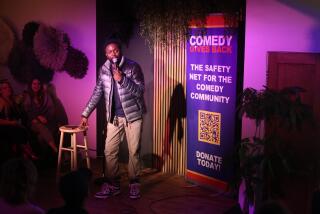Colin Quinn is embracing the moment — <i>his</i> moment
Colin Quinn is indignant.
He’s smiling, but he’s indignant.
“You just can’t have it both ways,” he said. “Everyone wants to be artisanal, vinyl, organic, but when it comes to people, they want it to be generic. Somebody’s got to make a choice!”
The longtime performer is on a downtown stage here, running through telltale characteristics of the Irish, Italian, black, Jewish, Puerto Rican and other groups that make up his hometown. The bits are part of his one-man crusade against political correctness, and part of a one-man show “The New York Story,” which opened to strong reviews and sold-out crowds at the Cherry Lane Theatre last month. (It’s now on a short hiatus before reopening in October.)
SIGN UP for the free Essential Arts & Culture newsletter >>
------------
FOR THE RECORD:
Colin Quinn: In the Aug. 30 Arts & Books section, a headline and a photo caption with an article about comedian Colin Quinn’s show “The New York Story” called it a Broadway show. The venue, Cherry Lane Theatre, is off-Broadway. —
------------
In an interview backstage, he elaborated on his philosophy. The world is filled with a colorful mix of demographics and ethnically informed character traits. Yet thanks to a culture of political correctness and a social media-enforced code of sensitivity, we’re increasingly reluctant to acknowledge them.
“I don’t know why we’re so scared [of these jokes]. It’s not saying people are inferior,” he said, with more of that smiling indignation. “It’s just saying everybody’s got their thing.”
“New York Story” has Quinn dissecting those traits by breaking down the many ingredients of the city’s melting pot. Employing his signature words-trip-over-themselves delivery, the comedian runs down the immigrant groups in chronological order, starting with the early Dutch and continuing through modern-day Russians and Latinos — part of his theory of how the “New York personality” came to be.
Sharply observed and frequently politically incorrect, “Story” spares no group.
On the arrival of Quinn’s ancestors: “You’ve got a city that’s sort of in disrepair.... It’s just a festering ground to breed resentment and misery. Who’s going to want to live there? The Irish.”
Of how African American students entered the classroom when he was growing up: “Then the black guys would come in five minutes later. Just swagger in, like the Medicis coming to Michelangelo,” he says as he struts across the stage.
Of his childhood Italian neighbors in his native working-class Brooklyn: “They would not be scared of stuff that would scare anybody else [physical threats]. And they would be scared of stuff that wouldn’t scare anybody [yogurt].”
With “Story” attracting packed houses, Quinn, 56, is having a moment. He’s had other moments, of course: as a cast member on “Saturday Night Live,” as the host of a late-night show on Comedy Central, as a force behind the faux-historical stand-up special “Unconstitutional” and the Broadway one-man show “Long Story Short.”
But this feels a little different. Some critics have called “Story” a creative peak. He has also written a humorous book on race, “The Coloring Book,” and is continuing work on his popular parody Web series “Cop Show.” Netflix aired a taped special of “Unconstitutional” this month.
Perhaps most prominently, Quinn has a key role in the hit Amy Schumer comedy “Trainwreck” as the free-speaking, MS-afflicted father of Schumer’s character.
Directed by Jerry Seinfeld — who helped shape the material early on — “New York Story” occupies a space between stand-up and one-man-show. Quinn honed portions of “New York Story” at comedy clubs throughout the city, then packaged it under a history-of-the-city conceit for the Cherry Lane. He has continued to revise it throughout the run.
In Quinn’s dressing room, some scattered historical material suggests his research. But the riffs mostly come from his own experience and thoughts, a kind of social science of the subway.
He is not above some ethnic reductiveness. Puerto Ricans are showy. Blacks are contentious. Jews are complaining. Irish are miserable. Italians are operatic. But he gets away with it by making his examples specific and his take absurdist, as with the New York taxi driver from Senegal who returns to his home country to deride the cabbies there. Quinn also does not spare white-liberal piety.
“You go to Black Lives Matter protests now and 60% of the people are white. You see kids yelling ‘black lives matter’ into a black cop’s face. ‘I’m trying to protect you from yourself!’ ”
He is, he said in the interview, hoping to make sense of a complicated world as much as point up ethnic disparities. “I’m not just writing a show to talk about race. I’m trying to figure out these differences myself.”
Quinn is embracing this moment, it should be said, on his own terms. The performer has often had an ambivalent relationship with mainstream Hollywood. Age, it turns out, has not mellowed him.
“Don’t get me started on that town,” he said when the subject of making movies comes up, laughing but not laughing as he described a series of politically incorrect immigration comedy scripts he has tried unsuccessfully to get off the ground. “I’ve been in that meeting so many times. They’ll say, ‘It’s interesting,’ and then you get that glazed look; you can tell with the tilt of their heads, their ‘Ah’ voice. It’s like trying to make a relationship work that isn’t working.”
Schumer, a Quinn protégé from the New York comedy scene who persuaded the performer to take the role of her father —who was inspired by her own dad — said she understands his outsider mentality.
“Colin does resist,” she said. “I think it’s 85% wisdom, and the rest is fear. Because even after all this time, it can still hurt when you get hopes up,” she said. “He’ll be the first to encourage you not to get in your own way and not to resist, but then he’s the biggest resister you can find.
“But he also has found what he loves and is doing what he loves. He’s not trying to buy a yacht. He’s not trying to be super-famous. He’s right where he wants to be.”
People Quinn knew from the comedy circuit years ago — Judd Apatow, Adam Sandler, Seinfeld — have found ways to reconcile their voice with a larger system. Quinn is of a different mind-set. He says he understands compromises are necessary to find mainstream success. He’s just not interested in making them.
“It’s really about not wanting to be in other people’s stuff. I’m going to audition for top directors? I always hated that, and now I really hate it,” he said. “Even if Scorsese calls me. I might do it if it was, like ‘Goodfellas 2.’ But he’d probably want me for a movie about 16th century monks. Who wants that?” he says, employing his signature voice that might be described as a cynical ebullience.
Quinn has a warmth too, both in person and onstage. Even his sharper jokes come with an undercurrent of affection. When he decided to play the role of Schumer’s father, he quietly went to visit the man several times at his home, neither asking nor telling anyone.
Still, it’s the outspoken, go-for-broke honesty that has helped him with audiences. The crowds in the intimate Cherry Lane have shown enthusiasm as he takes down what he believes is the personality-crushing power of political correctness. (This is a Seinfeld pet peeve too.)
Of the new climate of obnoxious sports fandom: “Hey, ump! You’re crazy!” Pause. “No offense to anyone with mental illnesses.”
Part of why he resists the political correctness is because he believes it tries to wipe out differences that will recur anyway.
“Everybody means well. But it just gets a little bit phony when suddenly people are colorblind and positive,” he joked in the show. “You’re telling everyone we’re all the same so let’s just wait until we blend together. I mean, there’s [always] going to be subgroups. Domini-Canadians, some day. Loud and quiet.”
But he also said the need for public politeness troubled him for another reason: because it elided basic truths.
“To deny Asians and Jews do better academically, I’m not saying that’s good or bad, but why deny the fact?” he said backstage. “Why deny that Irish guys love to drink, or why deny what Puerto Ricans like to do. So what?”
Onstage, he makes that point via a vivid bit.
“A guy could get stabbed. ‘Ah, I got stabbed,” he said mimicking a victim’s agony in replying to cops at the scene. “‘He was wearing blue jeans, black jacket,’ he tells the cops. The cops ask, ‘What color was he?’”
Quinn sits up and shifts his tone. “‘Color? I don’t see color.’”
Twitter: @ZeitchikLAT
More to Read
The biggest entertainment stories
Get our big stories about Hollywood, film, television, music, arts, culture and more right in your inbox as soon as they publish.
You may occasionally receive promotional content from the Los Angeles Times.







